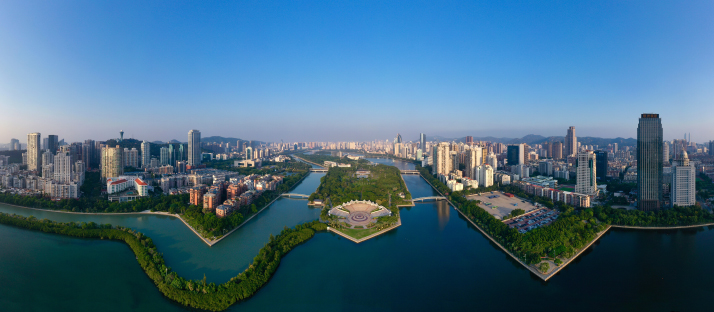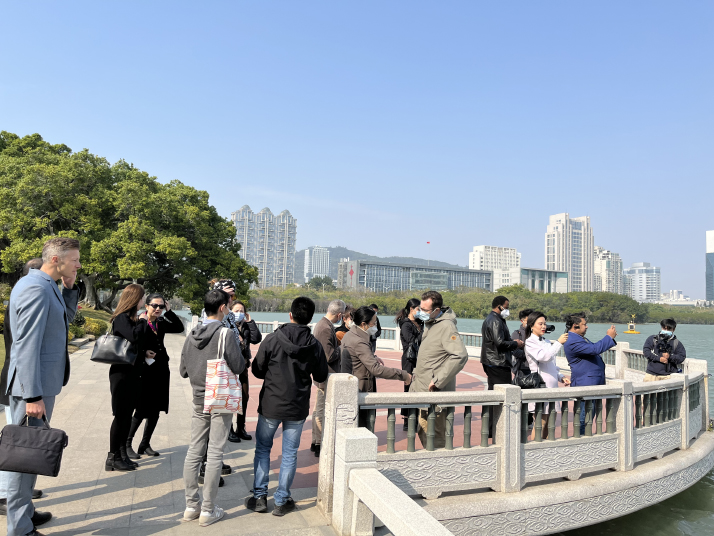| China |
| Yundang Lake, a shining example of China's ecological culture | |
|
|
 An aerial view of the cityscape around Yundang Lake in Xiamen, Fujian Province, on September 29, 2021 (XINHUA)
The 1.6-square-km Yundang Lake, located in the heart of Xiamen City in the southeastern province of Fujian, is a saltwater lake that reflects the surrounding urban landscape like a gleaming mirror. But this beautiful lake, today considered Xiamen's eco-signature, wasn't built in a day. Formerly an open port, the lagoon was created through a series of land reclamation projects. However, the construction of embankments blocked the flow of water, and the construction of factories around the lake caused a sharp decline in water quality. The area's stench could be smelled from afar. But since the mid-1980s, the local government has managed to transform it into a prime tourist destination and a popular place for locals to relax. And the lagoon's small, lush green islands are now home to the egret, Xiamen's signature bird. Pouring in support The management of Yundang Lake is a continuous effort. Over the past 40 years, Xiamen's successive municipal governments have diligently implemented intensive measures. Previously, 45 percent of the city's industrial wastewater and 50 percent of its domestic sewage were discharged directly into Yundang Lake, so controlling the sources of pollution was a top priority, according to a 2021 report by local newspaper Xiamen Daily. Cleaning the water was the first step. The polluting factories were either shut down or relocated. Then the sludge that had accumulated on the bottom of the lake for decades was dredged. In general, the lake is dredged about every 10 years. Over the past 30 years, 4.7 million cubic meters of sludge have been dredged, and 14 km of new embankments have been constructed, significantly reducing soil erosion in the surrounding lake area. The city also built facilities to treat polluted water. To restore the aquatic ecology, then, mangrove planting began along the lake's shores in 1999. As the planting area gradually expanded, the marine ecosystem regained vitality, and waterfowl once again returned. Coastal mangrove forests are resilient, withstanding salt, powerful waves and even rising sea levels. The famously twisty trees also provide shelter as well as abundant food sources for many different bird species. These measures could not be implemented without adequate legal and financial support. Since 1988, Xiamen has successively revised and introduced a range of related regulations. For example, a revised regulation on the protection of the Yundang Lake area officially took effect on May 1, 2020, establishing an all-round legal system. Meanwhile, the Yundang Lake Protection Center was established to oversee the sustainability efforts. To address the funding challenge for lake management, the Xiamen Municipal Government convened a special meeting on March 30, 1998, and decided that the municipal budget would earmark 10 million yuan ($1.4 million) each year for the following two years. That 10 million yuan was a significant amount, representing one tenth of the city's annual infrastructure investment, the report read. From 1984 to 2016, four rounds of comprehensive restoration were carried out, with a total investment of approximately 11.3 billion yuan ($1.58 billion). In recent years, Xiamen has initiated the fifth round of comprehensive restoration. In this latest round, the focus is on reducing the risk of contaminated sediments and associated pore water to human health and the environment, and enhancing the ecological and cultural values of the area. Total investment is expected to amount to some 8.6 billion yuan ($1.2 billion). Today, Yundang Lake boasts a beautiful ecological environment and is revered as the city's "ecological reception hall," exemplifying the Chinese practice of harmonizing the coexistence between humankind and nature.  Tourists at Yundang Lake in Xiamen City on February 25, 2023 (TAO XING)
Society-wide participation But this shining eco-beacon at the center of the city's urban landscape could not have been created without the support of its residential community. For example, the city has adopted a novel Volunteer Resident Park (or Lake) Chief system. The duties of these chiefs include collecting opinions from visitors and forwarding them to authorities, assisting in park (or lake) management, organizing cultural activities, and promoting tour etiquettes. The volunteering method has now taken root in many cities across China, such as Shanghai and Nanchang in Jiangxi Province, with more and more residents participating in their green development. Nationwide, people from all segments of society are joining forces in the practice of "green is gold"—an idea conceptualized by President Xi Jinping during his tenure as secretary of the Communist Party of China (CPC) Zhejiang Provincial Committee, in 2005. For example, the residents of Yucun Village in Zhejiang, where Xi put forward the concept, as early as 2003 decided to close down its limestone mines and cement factories after realizing the industry had caused severe damage to the local environment. The village has since successfully turned to green undertakings to generate revenue, including backpacking, mountaineering and fishing tours, fruit and vegetable picking, and many other agro-tourism activities. Nowadays, it is becoming more and more common to hear Chinese residents mention neologisms such as "dual carbon goal," aka China's national goal to peak its carbon emissions before 2030 and achieve carbon neutrality before 2060, or "zero-carbon village," according to a 2022 report by China Daily newspaper. Planting trees has become common practice in the country. Piao Shilong, a professor at Peking University's Department of Ecology, mentioned in a lecture on June 25, 2022, that "China has created the world's largest area of planted forests, with its forest coverage rate more than doubling from 12 percent in the early 1980s to over 24 percent in 2022. At least 25 percent of the global forest cover expansion since the early 2000s has taken place in China." In terms of biodiversity, China in 2021 imposed a 10-year fishing ban in key waters of the Yangtze River basin, an area covering 1.8 million square km and accounting for 40 percent of China's freshwater resources, with 228,000 fishermen on 110,000 boats giving up their nets. The ban has made solid progress in ecological conservation. For example, in the Jianli section of the Yangtze River in Hubei Province, the combined number of eggs produced by the four major Chinese carp species, namely black carp, grass carp, silver carp and bighead carp, during the breeding season surged from fewer than 100 million to 7.87 billion, the Ministry of Agriculture and Rural Affairs said on February 2, 2023.  The Haitian Terminal at Xiamen Port in Xiamen bustles with activity on August 3, 2023 (CNSPHOTO)
A Chinese answer Just a few decades ago, the Yundang Lake pollution problem posed a real conundrum for the city of Xiamen: whether to sacrifice the ecological environment for economic growth, and how to balance social development and environmental protection. But over the years, the city has managed to figure out the answers. Today, the lake's clear waters embody the transformation of Xiamen's development philosophy and methods, and bear witness to the city's vibrant practice of ecological progress. To date, Xiamen has won a series of awards and honors for its green development, including the UN Habitat Scroll of Honor Award, International Garden City, National Garden City, National Model City for Environmental Protection, National Ecological City, National Green Transport City and China's Top 10 Low-Carbon City. In addition to its pristine ecology, Xiamen's economic development achievements have been equally remarkable. Official data showed that, in recent years, despite covering only 1.4 percent of Fujian's land area, the city contributed 14.5 percent of the province's GDP and accounted for nearly 50 percent of the province's total foreign trade volume. The city's per-capita GDP topped $20,000 in 2020. Abdilahi Ismail Abdilahi, a Sinologist from Somalia who teaches diplomacy at Beijing Foreign Studies University, told Beijing Review that "the transformation of Yundang Lake reflects China's commitment to protecting its ecology," when he attended a field trip to the lake last February. Misbahul Ferdous from Bangladesh, who is director of Clinical Research at Lepu Medical Beijing, echoed Abdilahi's views during the same trip, adding, "China has achieved much in terms of economic development over the past decades, which has provided other developing countries with experiences in balancing the two (i.e., economy and environment)." Xiamen's practice is not a single case in China, but a miniature of the whole of China. Xiamen's answer is a Chinese answer. "This year, China accounted for over 30 percent of global economic growth, making the country the largest driver thereof. Its exports accounted for more than 14 percent of the world's market share," Han Wenxiu, an official with the Office of the CPC Central Committee for Financial and Economic Affairs, said at a seminar in Beijing on December 13, 2023. China's commitment to green development is based on low carbon, energy efficiency and environmental protection standards, Han said, adding that this approach will accelerate the green transformation of production and consumption, providing greater benefits and a broader stage for China's economic development. Most recently, the CPC Central Committee and the State Council issued guidelines to comprehensively promote the development of a Beautiful China. The guidelines noted that by 2027, the proportion of new-energy vehicles among all new automobiles should reach 45 percent. The use of old diesel locomotives will be phased out, and the combined transport volume of port containers by railway and waterway will maintain rapid growth. To enhance the diversity, stability and sustainability of the country's ecosystem, the guidelines aim to increase the national forest coverage to 26 percent and the soil and water conservation rate to 75 percent by 2035. By the middle of the century, China's ecological civilization will have been comprehensively improved, its green development and lifestyle will have taken full shape, and the deep decarbonization of its key areas will have been realized, the guidelines said. (Print Edition Title: GO-GREEN GOVERNANCE) Copyedited by Elsbeth van Paridon Comments to taoxing@cicgamericas.com |
|
||||||||||||||||||||||||||||||
|